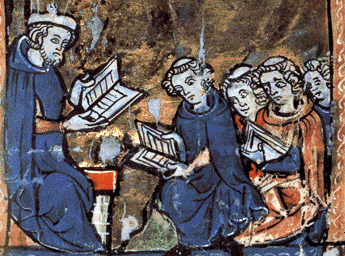Hrólfs saga kraka — chs 34-35 §34.3
hans ‘him’
gen. m. sg.
hann (pron.; °gen. hans, dat. honum; f. hon, gen. hennar, acc. hana): he, she, it, they, them...
Closehonum ‘him’
dat. m. sg.
hann (pron.; °gen. hans, dat. honum; f. hon, gen. hennar, acc. hana): he, she, it, they, them...
Closehátt ‘loudly’
nom. n. sg. adverbial;
3. hár (adj.; °-van; compar. hǽrri, superl. hǽstr): high
hátt ‘loudly’: Adverbs are normally formed from the dative form of an adjective. The adjective hárr normally means ‘high’ or ‘tall’, but also is used to mean ‘loud’.
Closevið ‘at that’
við ‘at that’: Once again a preposition is used without a pronoun; the object ‘it, that’ is understood.
Closehana ‘it’
acc. f. sg.
hann (pron.; °gen. hans, dat. honum; f. hon, gen. hennar, acc. hana): he, she, it, they, them...
hana ‘it’: Literally ‘her’, hana is the accusative feminine form of hann. It is used here to refer to the feminine noun skjaldborg, and so is translated idiomatically as ‘it’.
Closehon ‘it’
nom. f. sg.
hann (pron.; °gen. hans, dat. honum; f. hon, gen. hennar, acc. hana): he, she, it, they, them...
Closehon ‘it’
nom. f. sg.
hann (pron.; °gen. hans, dat. honum; f. hon, gen. hennar, acc. hana): he, she, it, they, them...
Closehon ‘it’
nom. f. sg.
hann (pron.; °gen. hans, dat. honum; f. hon, gen. hennar, acc. hana): he, she, it, they, them...
Close‘Nú viltu bana mér! Gør eigi þetta, svá sem ek hefi nú vel um búizk, en þú hefr nú rofit í sundr skjaldborg mína, ok hafða ek nú gǫrt hana svá háva útan at mér, at hon hefr hlíft mér við ǫllum hǫggum ykkar, svá at ekkert hǫgg hefir komit á mik lengi, en ekki var hon þó enn svá búin sem ek ætlaða hon skyldi vera.’
Teaching text: text section
Here you can see a piece of text. Clicking on words in the text will show you the dictionary headword, grammatical information and notes on how the word is used.
You should pay careful attention to the explanation of each word. You can test your knowledge using the translation and other exercises.
In some cases there may be audio of a modern Icelandic rendition of the text on this page.
